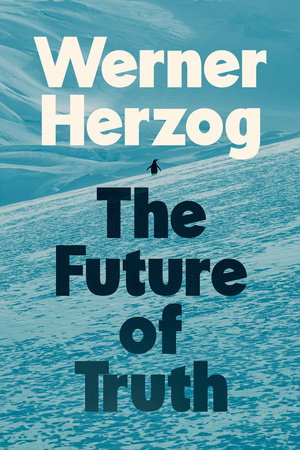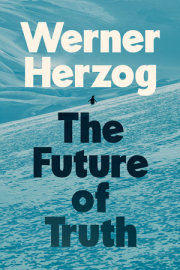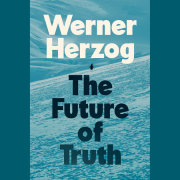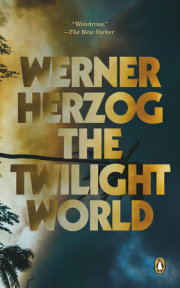01.What Is Truth?No one knows what it is, truth. Least of all the author. But philosophers don't know either, nor mathematicians, not even the Pope in Rome knows what it is, though he has his faith and the certainty of salvation to draw on.
Just this: I don't think truth is some kind of polestar in the sky that we will one day get to. It's more like an incessant striving. A movement, an uncertain journey, a seeking full of futile endeavor. But it is this journey into the unknown, into a vast twilit forest, that gives our lives meaning and purpose; it is what distinguishes us from the beasts in the fields.
The question of truth has accompanied me throughout my whole career. Is there truth in film? In art, in poetry? In music? Can we step out of ourselves as the mystics did in the late Middle Ages, to experience truth in a kind of ecstasy?
Ek-stasis, in Greek, is a stepping out of yourselves, a leaving the bounds of the individual, your place in existence. Is there ecstatic truth in art? Stay tuned.
For now, though, with fake news seemingly unstoppable, with endless possibilities of digital fakes, with the lying propaganda of politics, with a world from which every trace of truth seems to have disappeared, how can we keep our sense of orientation? Are we not living already in a post-truth age? We are capable of producing an incredibly realistic image of a person on video, and fitting to it a voice and speech patterns and an accent that are practically indistinguishable from the real thing. We can produce a digital version of the president of the United States ordering his National Guard to arrest his enemies, and put it online. And we know too that the wildest, most outrageous claims spread roughly three times as fast as factually true accounts. It's been measured.
On the internet there's an endless conversation I am having with a Slovenian philosopher in which our voices are mocked up very accurately, but our conversation is meaningless twaddle. There are no new ideas, just a simulacrum of our voices holding forth on various topics on which we did indeed once hold forth. Our sentences are grammatically correct and have the right vocabulary, but our dialogue is soulless, is dead. It's nothing but mimicry. The BBC recently broadcast a journalist interviewing a virtual Charles Darwin. You can see him in 3D, not especially well-done this time, but there he is, speaking in an academic-sounding Oxford English with appropriate facial expressions-again, somewhat crude, maybe like a bad actor in a rotten Hollywood film. But all of that can be rapidly improved. What's interesting is that Darwin speaks in complete, well-formulated sentences that make sense, but what he says in them is nothing more than a stodgy cut-up of his ideas and others' that are current online just now. Darwin's "brain" has been programmed from millions of facts from the internet. Hence his way of making sketchy arguments and spouting outright nonsense from the internet, apparent insights that reflect popular fashions and trends more than any reality. The journalist asks him questions about climate change and a possible salvation for mankind. Darwin responds with some blah about the possibility of leaving this planet and a million of us starting a colony on Mars.
Darwin's answer is nothing but a collective self-deception. You don't have to be an astrophysicist or biologist, or some other kind of expert, to know that any such plans are completely idiotic and unfeasible. Just as you don't have to be an astronomer to grasp that the sun doesn't orbit around the Earth, but the Earth around the sun. Copernicus hesitated for decades before publishing his results, and a hundred years later Galileo repudiated them in order to save himself from torture at the hands of the Inquisition. In the case of results of this order, time is always the best ally. "Truth is a daughter of time," said Leonardo da Vinci-even if the classical author Aulus Gellius said it first.
The previous century brought with it the calamity of realized social utopias, of communism as earthly paradise. Whoever didn't want it or couldn't grasp the fact was by definition insane, and had to be shut away in a gulag or an asylum. Likewise the other great social utopia, fascism. In its worst form, it meant the idea of an Aryan master race that would conquer the whole world and destroy anything inferior. In our present century, we are headed for the collapse of technological utopias. We will not attain immortality by crisping our genes, nor will we conquer the cosmos. There are numerous candidates for planets that are capable of sustaining a life like ours on Earth, the only problem is that the nearest of them is about twenty thousand light-years away. It is highly likely that there are forms of life "out there," viruses, fungi, perhaps even the kind of advanced life we find in the snot of toddlers. The possibility can't be ruled out, because as well as one universe, we share the same physics, the same chemistry, and the same history. But those planets are too remote. Astronomers understand these things best. To find life demands journeys lasting millions of years. Best of luck to the intrepid settlers. Alpha Centauri, the closest star outside our solar system, is a mere 4.5 light years away. Because our soft bodies can't tolerate abrupt acceleration to unimaginable velocities, the journey would take a very long time. A further factor is that the travelers would then have to take just as long decelerating, braking their speed. In order to reach even a tenth of the speed of light, we would have to take extraordinary quantities of fuel with us, and, assuming for the moment that we are talking conventional hydrocarbon fuel, fuel of the kind we use at present, the quantity required would be not merely the equivalent of all petroleum deposits anywhere on the planet and not only the mass of the Rocky Mountains and all other mountain chains in the world but of the entire planet. What's more, we would have to burn the total energy of the entire solar system, the Milky Way, and all visible galaxies. There are voices that like to brabble about using antimatter, and we have indeed succeeded in producing that in tiny quantities. But in order to light up a single bulb it would cost the entire annual GDP of the United States. To produce a teaspoonful of antimatter would take many billions of years. You don't need to know anything about it yourself, but I would recommend speaking to an astrophysicist or astronomer.
But hey, there's Mars. It's about four and a half months away, providing the orbits of Mars and Earth are at their closest alignment. There is little doubt that before long we will be sending astronauts there on brief missions. What's striking is that the project has been postponed and postponed and postponed-and has been for decades. Mars is an inhospitable kind of place. On the way there, and on the planet itself, we might be consumed by energy from the sun, so-called solar winds; it's tempting to keep things simple and just sit in a microwave instead, and switch it on. The surface of Mars is highly toxic. We would have to dig ourselves deep into it, but what with? Where will we get the caterpillars to dig us deep bunkers? It might be simpler just to surround ourselves with ten feet of water to keep off the radiation. It is possible to withstand the temperatures on Mars, but where will we get the enormous quantities of energy that we need? Given that the sun is so far away, it hardly counts as a possible source. And for astronauts a ticklish problem still hasn't been solved: How will they store enough fuel to get them back to Earth? Then there's the matter of the respective orbits of Earth and Mars: Following our arrival after months of voyaging, Earth and Mars would be so far apart that we wouldn't have sufficient fuel to undertake the return journey after a brief stay of a week or so. Not for another thirty months would Earth and Mars be in a favorably close conjunction again.
And so back to the utopia of the million-strong colony on Mars. This project, this delusion, is treated as if it were truth, though it more nearly resembles some cult belief. We are told we could obtain water by melting the ice on the poles of Mars; a nuclear explosion should do the trick. Presumably that's right, but how are we going to get an atom bomb with all the requisite technology to Mars, and how are we going to get the water to our settlements over hundreds or thousands of miles? In pipelines? How are we building those? Where do we get the labor force, the piping, all the construction? Robots could do it, and intelligent robots could build great domes over our cities to shield us from radiation as well. But for all that, we would have to dispatch thousands of rockets at intervals of a few seconds, a whole armada targeted at the same landing space. That's completely beyond us. How are we going to build biotopes, with air to breathe? It seems to be chemically present on Mars, but in diminutive quantities. And at the back of all these questions lurks a single, far more important one: Isn't it an obscenity anyway, rigging up an uninhabitable planet with incredible resources to make it habitable, instead of seeing that our own planet remains habitable?
For myself, I would give a lot to go on a Mars mission, but only with a camera with which I could make daily bulletins to send the folks back home. And I would love to go home after the end of a week. I applied unsuccessfully for a spot on a Japanese space shoot, a lunar orbiting mission without a landing. Elon Musk, should he indeed, as promised, fire one of his SpaceX rockets to Mars, would presumably take me along, or at least so he told me when we met. I am irked that to date only technical people have been allowed to go as astronauts. No poet was ever shot up into space. On the subject of Elon Musk: In my opinion, his vision of a million earthlings colonizing Mars is just a way for him to sell more cars. Musk is sufficiently intelligent to understand that he is promoting a pipe dream, but he's doing it with the sober calculation that it will secure his reputation in the media and online for being a "visionary." This will reflect handily on his products. All other cars (for instance, those being made in China) are just garden-variety industrial products fighting for market share, but we, we're buying the electric car of a visionary. Elon Musk didn't invent the electric car, which has existed since the nineteenth century, nor did he found his company Tesla-he bought in. The truth of the visionary Musk is a mosaic of half-truths. All in all, I am of the view that Elon Musk has done everything right on all his products: electric cars, a new generation of batteries, reuseable rockets. We'll see how he ultimately fares with his acquisition of Twitter.
Artificial intelligence has long since overcome its limitations in closed systems. Computers have been beating grand masters for some time, and lately they have improved at Go-the Asian board game that is much more complex than chess, and above all needs more intuition. Some of the great Go players are revered as artists. AI crossed a threshold in 2017 in chess that was generally viewed as a profound caesura. The technology company DeepMind brought out a chess computer, AlphaZero, which overcame what had thus far been the most powerful program, Stockfish. Computers have been outperforming humans for years now, but a new horizon was breached by AlphaZero because the program wasn't fed by tens of thousands of chess matches to analyze, but just with the rules of the game and the objective: to checkmate the opposing king. From that, AlphaZero developed its own program in the space of four hours, and played forty-four million games against itself in its first nine hours, from which it devised strategies for winning. Both Stockfish and AlphaZero can evaluate seventy million moves per second, but AlphaZero has developed a form of intelligence that wasn't synthesized from previous human experience, as was the case with Stockfish. Of its first hundred games, AlphaZero won twenty-eight, and drew seventy-two, and lost none. In the thousand following games, the results were broadly similar, though it was forced to concede defeat half a dozen times.
Today's AI can broadly teach itself. It sees its occasional errors, and arrives at strategies and decisions that were not programmed in it by humans. What is especially worth noting here is that AI functions with a little pinch of chaos and imprecision, as is also embedded in human nature. Not dissimilarly, a mathematical "fuzzy logic" has been built into the microchips in our washing machines and the steering of our cars and our digital photographs. The nice thing about it is that at the end of the day our laundry is clean and our photographs are in focus.
After just a few years, AI is able to analyze the structure of complex enzymes much faster than classical biochemistry ever could. This will lead to great improvements in the design of vaccines, and in the pharmaceutical industry altogether. The design of robots will be accelerated, including that of "companion robots," fluffy things with big eyes that will be able to read our facial expressions, and cheer us up when we're sad, or talk to us when we're lonely. Already the imitation is almost perfect. There is next to no difference between the truth and the imitation of feelings.
Transport will be reimagined, as will certain aspects of quantum physics, and the future of warfare. A series of other, somewhat disturbing, innovations is also on the way-for instance, the possibility of comprehensive, mass supervision, of disinformation, of manipulation on a vast scale. Is truth done for, the same as various branches of the economy? The risks are clear. Shortly before his death, Stephen Hawking warned us regarding the danger of advances in AI, and one of our most significant political thinkers and actors took up the theme when aged almost one hundred. I am speaking here of Henry Kissinger. No matter what one makes of him politically, such intense efforts on the part of a centenarian should make you sit up.
In 2023, some thousand scientists and programmers published an appeal calling for a pause in the development of AI, so that legal and ethical difficulties could be resolved. Another possibility is that the varying standpoints of the liberal West and the less liberal East-China, for example-will pull down a new, digital Iron Curtain. There is no such thing as a worldwide "cloud"-all of it only works through various physical servers and routers, which can be controlled and switched on or off.
Copyright © 2025 by Werner Herzog. All rights reserved. No part of this excerpt may be reproduced or reprinted without permission in writing from the publisher.









